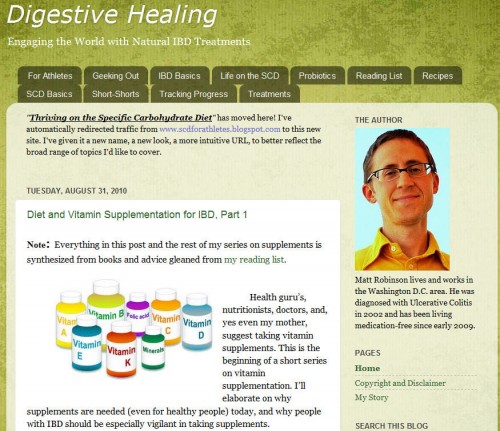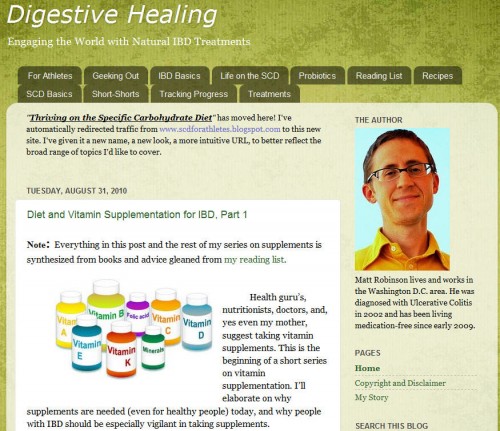Matt from Natural Digestive Healing

We make it a priority to highlight SCD personalities from across the internet. We love hearing success stories and want to spread the knowledge of those brave enough to share their specific carbohydrate diet stories.
This week we are pleased to spotlight Matt Robinson who runs a blog called Natural Digestive Healing. His blog details his incredible journey taking control of his UC without medication, starting with the SCD Diet. Matt is really interesting because he was an incredible endurance athlete before his UC diagnosis and continues to compete while following the SCD Diet, which inspires me when I get tired from chasing my 2 year old son around the house…
Take some time to check out his site and take in all the valuable information he has laid out in a simple, easy to
understand format. He has tried many different additional treaments and shares his experiences with each one. The nutritional information he provides alone is worth the gander, but the best stuff he has is in the pschology of the diet and how he has been successful.
Before we get to his interview I wanted to share a couple quotes from two of my favorite posts on his site that I feel strongly will help out all SCD’ers. The first is a really powerful post summarizing a conversation Matt was having with a woman as she and her husband started trying to get a handle on his Crohn’s diagnosis:
“Before I start this post, it’s important to note that I handle 90% of my symptoms with the Specific Carbohydrate Diet. It took us (both my wife AND me) a long time to accept the lifestyle changes that I needed to make… For a long time, neither of us wanted to hear it. So, when I write, just know it’s taken me almost two years to come to terms with my new lifestyle. Every improvement that the SCD, however, has given me has made the transition easier–a light at the end of the tunnel.”
Another awesome post Matt put up that I like is about how to build a relationship with your Dr. All of us in the SCD community have had some bad experiences with Dr.’s along the way, so this article is great for finding a way to start a new relationship off on the right foot:
“When you’re first searching for a GI, view the first appointment as an interview. Make sure the two of you are a fit. It can be a bit like dating… Is the doctor respectful? Does he/she take time with you? What are his/her credentials? Why did he/she get into medicine? Does he/she listen to you? Is he/she open to naturopathic treatments? etc.”
We had the opportunity to ask him our usual SCD Diet success questions and he did not fail to deliver. Read this over a few times, it is incredibly powerful.
1: Why did you start the diet (share your story)?
I started the diet during a massive flare-up (my last flare) that started in 2008. After about 9 months of medicine after medicine (Asacol, Colazol, Imuran, and two rounds of Prednisone), nothing worked for me, nothing was controlling my colitis. I was still going to the bathroom between 8-24 times per day. I was anemic, malnourished, and excruciatingly tired. I had fevers and uncontrollable shaking. My joints ached. I lost 20 pounds (down from 150 to 130lb. I’m 5′ 10″).To give you an idea, I am a competitive ultra-endurance athlete, and I couldn’t even climb a flight of stairs. The doctor had begun to mention that they could take out my colon.
No way.
I’m also a self-proclaimed geek, so I read a lot. In May, 2009, during one of my (many) research sessions, I stumbled onto the Breaking the Viscous Cycle website on a lark, while searching for dietary suggestions for people (like me) with Colitis. A dietary mode of dealing with IBD? But my doctor said that diet had nothing to do with it? I ordered the book. Nothing else was working. What did I have to loose?…only my colon.
2: How did the SCD Diet change your life?
As I said, I’m a geek, so I had been meticulously tracking my treatments and symptoms. Four days into the diet, I noticed a change for the better. That was June, 2009, and it was my first sign of improvement in over nine months.. By August, 2009 I was down to 2-3 bowel movements per day–from 8-24 (depending on the day). I could no longer see blood in my stool. By the end of August, I had weaned myself from medication. My bowels continued to improve. By Christmas, 2009, my bowels had pretty much stabilized (unless I ate something weird by accident). My stools were still loose, but I had regained my energy and the weight I’d lost. I began to run and to lift weights. I no longer needed to nap at lunch. I had energy to help my wife and to play with my (two) kids.
3: What was the biggest challenge you faced on the diet and how did you overcome it?
The biggest challenge for me was convincing my wife of the changes I needed to make–essentially, we would both have to adopt the diet. I work a lot, so she would bear the primary burden of cooking, grocery shopping, etc. We needed to be in it together. No more calling for pizza if we both had a long day. No more dates out to eat (at least at first; we eventually found some places we could go). We asked, What do we do when we go to potlucks with friends or family? How do we travel? It looks like a lot of work and we’re already busy, can we do it? Can I (Matt) give up bread and beer? Will my wife have to give up those things too?
All (or most) of these changes seemed to rest on her. It took a month of talking about it, of back and forth, before she agreed to essentially be my primary care giver. We were already both proficient cooks, so I agreed to cook on the weekends, and to help where I could; however, giving her time to adjust to the idea and commit to the changes of the SCD, herself, was a big challenge. To her credit, she’s been happily doing it for almost 18 months now, and we both love it. She lost weight and gained energy too. It’s been beneficial to both of us. We have rediscovered the joys of the family meal and cooking has become (most days) an enjoyable part of our everyday life.
4: What is the number 1 piece of advice you would give someone thinking about starting the diet?
Make sure you know what you’re getting into, and then commit to a minimum of 30 days. Let me explain. The SCD is such a radical shift from the everyday American diet and lifestyle that you need time to marinate in the changes you are about to make. You need time to adjust your mindset some, consider what you will gain, weigh it with what you will give up, and make the commitment.
For example, when people ask me, Don’t you miss (insert your favorite food)? Or, Wasn’t it hard to give up (insert your favorite food-based social activity)? Or, my personal favorite, Aren’t you tempted by (insert food)? I usually answer that last one with, “Are you tempted to drink untreated water in Mexico? Of course not, you know what it will do to your gut. It’s the same thing with me and (insert food). I know what it will do to me, so I’m not tempted by it.” That doesn’t mean that I don’t get jealous when, at a cookout, everyone else is eating bread, ice cream, and drinking beer. It’s not the food that tempts me though, it’s the freedom that they have that makes me jealous sometimes. That’s another discussion…
The bottom line is, if I hadn’t taken the time to meditate on the changes I was about to make with the SCD, if I wasn’t wholly committed to making this change for my own health, when those questions came up I wouldn’t have been able to stand my ground, to stay on the diet, and I would be back in the doctor’s office instead of writing you now.
So in setting your mindset, do consider what your giving up, but put a different spin on it. You’re giving up a life of diarrhea, medicine, surgery, hospitalization, lethargy, undernourishment, and (perhaps) cancer. I’d give up chocolate to avoid those things any day.
Did You Like this Article?
Subscribe to our newsletter to receive email notifications, some ways to find relief, and next steps.

